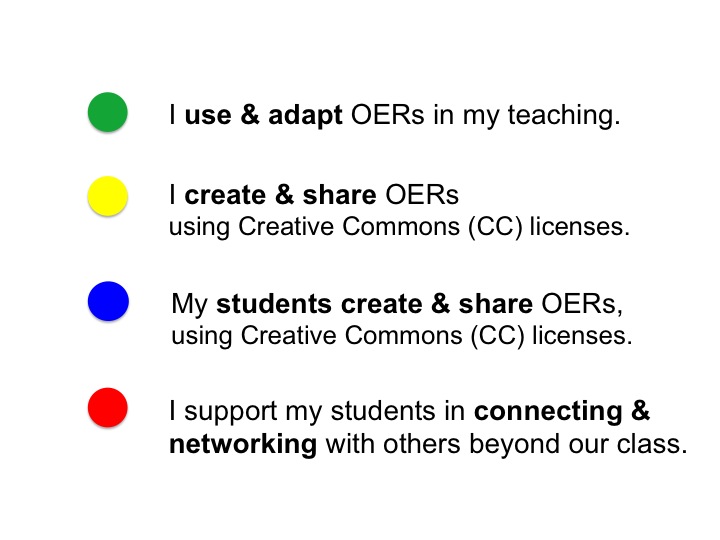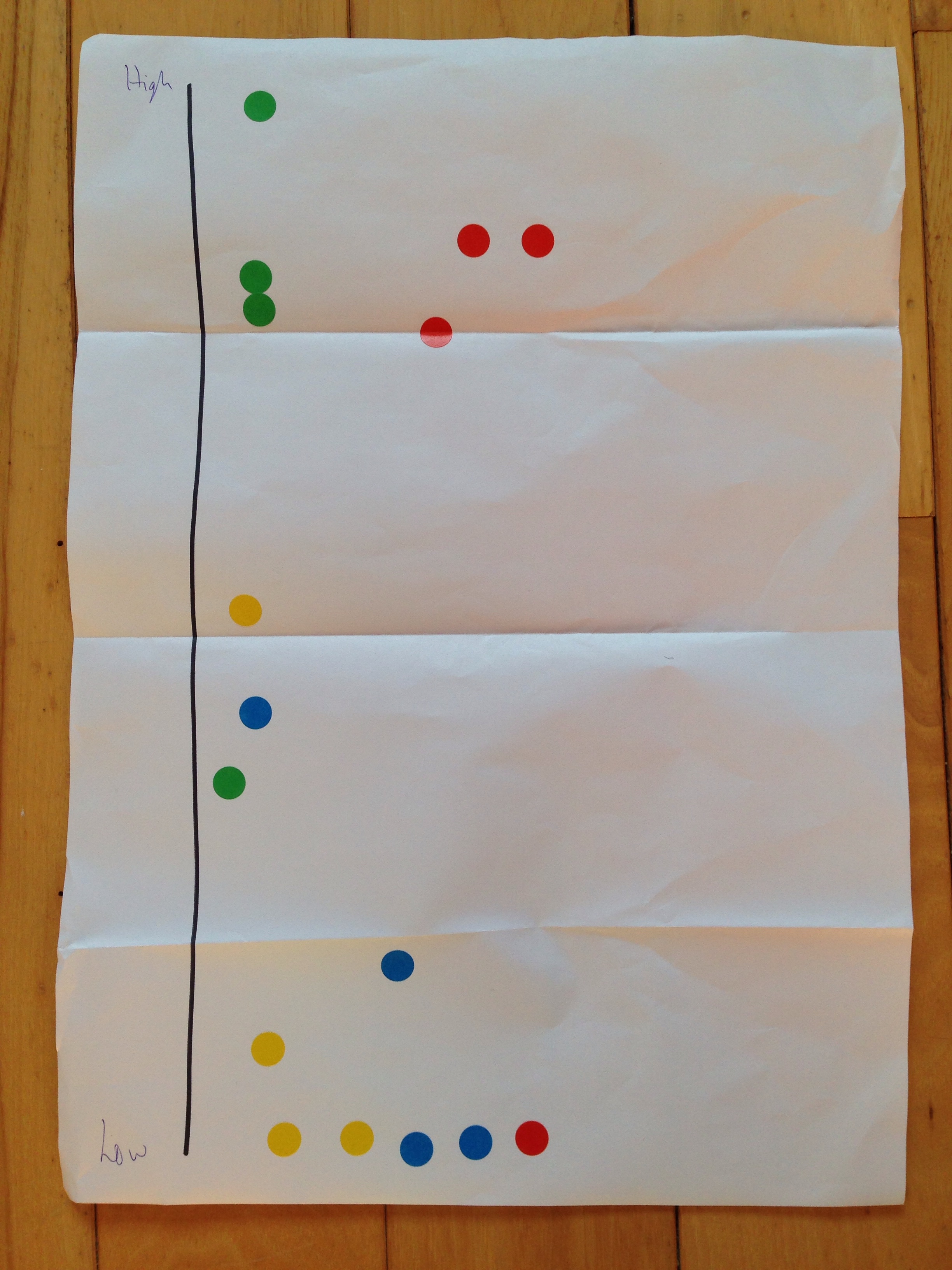I facilitated a workshop with academic staff at GMIT (Galway-Mayo Institute of Technology) last week in which we considered, mostly through group discussion, openness as educators. Carina Ginty invited me to share some of the ideas from Navigating the Marvellous: openness in education as a prompt for the discussion. The following slidedeck summarises some of the concepts we explored and the activity used to kick off the discussion.
ccc
The academic staff who participated in the workshop were from a wide range of faculties: engineering, IT, business, marketing, tourism and arts — as well as the library. In addition to their discipline-specific work, all of the lecturers teach a skills development module Learning and Innovation Skills for first-year students, with the goal of “empowering students with the skills to be successful in third level education and the workplace”.
After initial discussion and exploration of our definitions of openness, OER, copyright and Creative Commons, I asked participants to work in small groups to map their open practices on a scale from Low to High, using this colour code:
 Each group created a different map of their current practices — here is one of the maps produced:
Each group created a different map of their current practices — here is one of the maps produced:
This activity was a quick and engaging discussion-starter. There were lively conversations in small groups, and afterward in the large group, about openness, privacy, use of social media, and how academic staff are — and are not — protected when working in open spaces.
Not surprisingly, all of the the participants had used or adapted Open Educational Resources (OER) when designing their own teaching activities and materials. However, there was little experience, across the group, of creating and licensing OER, or supporting students in publishing their work openly. This was noted by the group as an opportunity for future development. We discussed a few of the many different social media tools that can be used by students and educators to create, share, and publish work openly, e.g. various blogging platforms, Twitter, Scoop.it, Wikipedia, Google Drive, Google maps, etc. A few examples can be found in this great post by Debbie Morrison: How-to Use Social Media Platforms to Create Meaningful Learning Assignments, and in the CT231 blog post: A Module Ends, A Networked Community Continues.
Apart from using this as a simple group exercise in considering openness, many of the academic staff participating described how they might adapt the simple “coloured dots” activity in their own learning activities with students. Like any workshop with educators: always many levels of teaching and learning happening 🙂
My thanks to Carina Ginty and all of the participants for a thought-provoking session — and for an outstanding lunch afterward, cooked and served by students from the College of Tourism & Arts at GMIT.
Image: CC BY-SA catherinecronin “considering openness” on Flickr

I love these quick mapping activities, it can always be surprising what turns up. One particular surprise for me are the red ones high up the page indicating strong support for “supporting students in connecting & networking”.
It would be interesting what their perception of this activity is. My experience is that it means colleagues often point students in the direction of where to go and then perhaps leave them to it. I think what is more important is that the teachers then support students in the process of going into these networks and then bringing the experiences back into the class to reflect.
I am not sure how much depth you got to with the subsequent discussions but I would be interested in whether you were able to tease out their current practices with regards to this. One reason I ask is that I am developing a course to help equip academic staff to engage more actively in open online networks (details here: http://flippedacademic.co.uk/snippets/2014/10/13/wake-me-up-before-you-gogo ) and so I am trying to get a sense of how well equipped staff in other institutions are with regards to open, online learning networks.
Hi Simon, many thanks for your comment and questions. Yes, this was a very interesting observation in the workshop — missed in my quick overview above 😉 You are right that many educators point students to resources and networks which may be of interest, and many in this workshop described this. While helpful, this is really of limited value in helping students to build their own networks, or to develop their networked learning skills, as you point out. There’s a big difference between saying “Twitter’s great; lots of interesting educators there” and actually creating purposeful activities in which students *as a learning community* experience that, both alongside one another and alongside us. My main message about this is on slide 24 in the presentation above: individuals can be nodes in a network, but learning communities can also be nodes. This is immensely powerful in modeling networked learning and enabling peer learning.
In my experience, this relies on a few things. The educators in question need to have some experience of networked learning themselves, be comfortable with being “out of control” and “not the expert”, and at a deep level be committed to democratic practices. In my experience, alongside the willingness to share, these are the key traits of open educators. Not forgetting kindness, of course 🙂
I’ve had a quick look at your blog post and am mightily intrigued! This looks like it could be a very useful course for educators. I’ll have a think about the questions you posed and write a comment in your blog post.
“The educators in question need to have some experience of networked learning themselves” Catherine, I fully agree with this, it is so very true and partly what I am wishing to achieve through the development of the on-line open course is to provide such experiences so that they can be “out of control”. However, we need to ensure these are “safe” and “kind” places and experiences for staff and I am proposing that one way to do that is to have locally facilitated learning groups for on-line courses.
Would love to hear your thoughts in more detail on my proposal, whether you think there is any mileage in it, and to what extent it can overcome some of those challenges we have eluded to here.
Simon, I think your idea of layering locally-facilitated groups onto the open online course is a good one — particularly for building trust and confidence for those new to networked learning. I’ve just posted a longer comment on your proposal: http://flippedacademic.co.uk/snippets/2014/10/13/wake-me-up-before-you-gogo
Great idea Catherine, I may re-use that. Thanks for sharing
Thank you, Sheila. As you always say (and so well) — this is why we share 🙂 Please feel free to use and adapt as you will!
What a fab idea Catherine 🙂 I’m doing a workshop next week looking at Open Educational Practice and establishing a network of OER/OEP Champions in Wales – I’ve found your post really useful and I’d really like to use some of your ideas there 🙂
I’m glad this was useful for you, Deb. By all means, please use and adapt anything at all that you find here — my blog, Flickr photos, and Slideshare presentations are all CC-licensed. Best of luck with your workshop next week. Heading over to your blog now 🙂